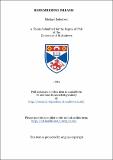Files in this item
Remembering dreams
Item metadata
| dc.contributor.advisor | Squires, Roger | |
| dc.contributor.author | Robertson, Michael | |
| dc.coverage.spatial | viii, 306 p. | en_US |
| dc.date.accessioned | 2018-06-27T13:41:05Z | |
| dc.date.available | 2018-06-27T13:41:05Z | |
| dc.date.issued | 1994-07 | |
| dc.identifier.uri | https://hdl.handle.net/10023/14663 | |
| dc.description.abstract | This thesis concludes that our commonplace conviction that dreams are dreamt during sleep and remembered or forgotten upon waking is, at best, a speculative hypothesis open to a very reasonable scepticism. The conclusion follows from a defence of the Dispositional Analysis, that to remember or forget a dream is to retain or lose an ability acquired during sleep to tell without invention or inference a fictitious story as if of events witnessed and deeds done. According to the Dispositional Analysis everyday talk about dreams being dream during sleep stands open to contradiction by empirical evidence supporting Globot's Hypothesis that the content of our awakening narratives is explained by peculiarities in the manner of awakening. According to the Dispositional Analysis, our ordinary assumption that 'telling a dream' is an exercise of memory can only be tested within a theory enabling us to predict whilst a person is asleep what, if any, dream he would tell, if awoken in a normal manner, prompted to say what appeal's to have happened (no matter how incredible or unimaginable), and not distracted. Chapter One ("Events Witnessed and Deeds Done") argues that sober reflection on what we already know shows that, in 'telling a dream', a person usually does not remember perceptions and actions from sleep. In Chapter Two ("The Unimagined and Unimaginable") argues that the ability to tell a dream cannot be reduced to memory of thoughts and intentions directed towards images. The conclusion drawn from Part One (What Appeals To Be Remembered) is not merely that there is no general account of what beaming consist in, as if the fact that we do not remember illusory perceptions, thoughts or images shows that we do remember something else, some irreducible mental activity. The conclusion is that when we 'remember dreams' we generally remember nothing of what happened during sleep. Chapter Three ("'Actions' During Sleep") argues that the scientific study of sleepwalking, sleeptalking, night terrors, prearranged 'signalling' during sleep fail to support die hypothesis that a person remembers thoughts and intentions from sleep. Chapter Four ('"Perceptions During Sleep"), it is argued that neither evidence of physiological activity peripheral to the central nervous system (e.g. eye movements, muscular twitches, penes erections, etc.) interpreted as 'covert behaviour' during sleep, nor evidence of neurological activity of the forebrain interpreted as critical responses to internally generated 'stimuli' supports the Received Opinion that dreams are episodes remembered from sleep. Part Two ("Scientific Studies of Sleep and Dreaming"), concludes that experimental sleep research is consistent with the conclusion that a person telling a dream is typically not remembering mental acts, events, states or processes from sleep. Part Three ("The Dispositional Analysis") questions the implications of the conclusion that the Received Opinion is false. Chapter Five ("Dreaming Without Experience") argues that our conviction that dreams are dreamt or 'occur' during sleep is an empirical hypothesis which survives the falsification of die Received Opinion. The conclusion drawn here departs both from that of Malcolm's (1959) argument that the concept of dreaming is not a theoretical concept and from that of Squires' (1973) argument that dreaming is a bad theoretical concept. Chapter Six, argues that assumptions about the causal explanation of telling a dream whilst central to our talk about dreams being dreamt or occurring during sleep cannot not explain our commonplace conviction that dreams are remembered from sleep. In particular, it is argued against Dennett (1976) that a causal-cum-representational analysis of remembering dreams does not escape the need to distinguish between the everyday notion of memory appropriate to retaining an ability to tell a dream and a technical notion of storage in short-term 'memory'. The Conclusion ("A Truth of Underwhelming Importance?") reflects upon the gap forced by the thesis between the unreasoning confidence of our awakening conviction that dreams are remembered from sleep and the speculative justification accorded to it by the Dispositional Analysis. It recommends an uneasy resignation to die conclusion that our undoubting faith that something is remembered reduces to nothing more substantial than the hypothesis that 'telling a dream' is the exercise of an unconsciously acquired and retained disposition to awake with a merely apparent memory of episodes occurring during sleep. | en_US |
| dc.language.iso | en | en_US |
| dc.publisher | University of St Andrews | |
| dc.subject.lcc | B105.D8R7 | |
| dc.subject.lcsh | Dreams--Philosophy | en |
| dc.subject.lcsh | Memory (Philosophy) | en |
| dc.title | Remembering dreams | en_US |
| dc.type | Thesis | en_US |
| dc.type.qualificationlevel | Doctoral | en_US |
| dc.type.qualificationname | PhD Doctor of Philosophy | en_US |
| dc.publisher.institution | The University of St Andrews | en_US |
This item appears in the following Collection(s)
Items in the St Andrews Research Repository are protected by copyright, with all rights reserved, unless otherwise indicated.

